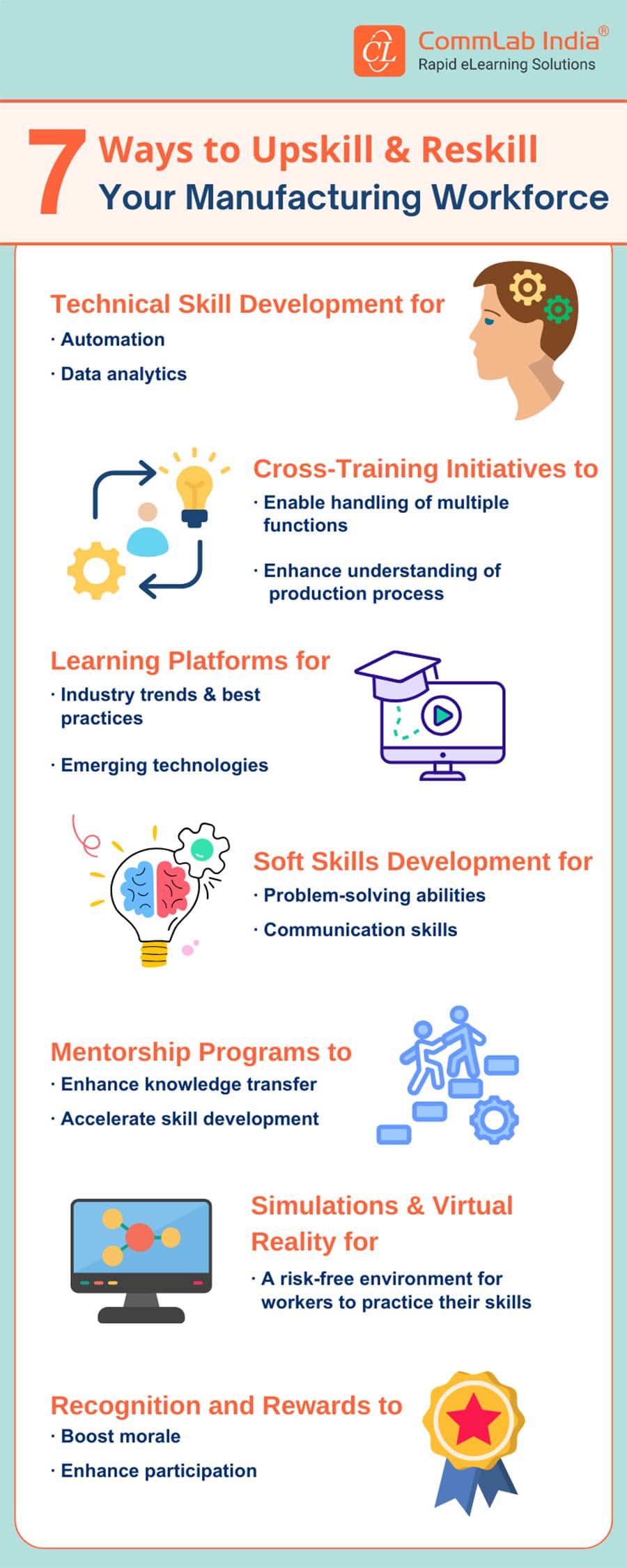7 Ways to Upskill and Reskill the Manufacturing Workforce [Infographic]
![7 Ways to Upskill and Reskill the Manufacturing Workforce [Infographic] 7 Ways to Upskill and Reskill the Manufacturing Workforce [Infographic]](https://blog.commlabindia.com/hubfs/blogs/manufacturing-sector-digital-upskilling-infographic%20.jpg)
Manufacturing stands out as one of the most operationally intensive industries, characterized by detailed processes, advanced machinery, and dynamic supply chains. As technology continues to advance, the importance of upskilling and reskilling within the manufacturing sector is on the rise. In this highly competitive landscape, where efficiency, innovation, and agility reign supreme, the ability of the workforce to adapt and thrive in the face of digital disruption is necessary.
The convergence of digital learning technologies, automation, and data-driven insights is reshaping the skills required in manufacturing, demanding a proactive approach to workforce development. As the sector accelerates towards greater digital learning integration, upskilling and reskilling initiatives emerge as strategic imperatives to empower employees with the capabilities needed to harness the full potential of digital learning.
Why is Upskilling and Reskilling the Manufacturing Workforce Important?
In the global world of manufacturing, upskilling and reskilling the workforce have become essential for staying competitive and future-proofing operations. Technological advancements, and automation, are reshaping the skills required in the manufacturing industries. As traditional roles evolve and new technologies emerge, manufacturers must equip their workforce with the necessary skills to adapt and thrive in this dynamic environment. Upskilling and reskilling initiatives ensure that employees remain relevant, capable of leveraging new technologies, and contributing to innovation and productivity within the organization.
Moreover, investing in upskilling and reskilling programs is not just about meeting immediate skill gaps, it's also about fostering a culture of continuous learning and growth. By empowering employees to acquire new skills and knowledge, manufacturers demonstrate their commitment to employee development and engagement. This also cultivates a more agile and adaptable workforce that can effectively navigate future challenges and opportunities.
→ Download Now: Upskilling Sales Team through Digital Learning [Case Study]
What are the Effective Ways to Upskill and Reskill your Manufacturing Workforce?
How Digitalization is Transforming Upskilling and Reskilling in the Manufacturing Sector?
In the manufacturing sector today, digitalization is intricately linked to upskilling and reskilling the workforce. A Deloitte study revealed a compelling statistic where 86% of surveyed manufacturing executives foresee smart factory solutions as the leading drivers of competitiveness in the upcoming five years. This throws light on the urgent need for manufacturers to embrace digital learning technologies and equip their workforce with the requisite skills.
With smart factory solutions poised to revolutionize manufacturing processes, upskilling and reskilling initiatives are vital for making sure that employees can leverage these technologies to their full potential. From mastering data analytics and artificial intelligence to understanding the basics of automation, the workforce must be well-versed with the skills and knowledge required to thrive in the digital age. By investing in upskilling and reskilling programs, manufacturers can empower their employees to embrace digital transformation, drive innovation, and remain competitive in an increasingly digitalized marketplace.
To Sum it up!
As the era of digitalization continues to unfold, the success of the manufacturing sector will be intrinsically tied to its commitment to nurturing a skilled and adaptable workforce ready to embrace the opportunities presented by the digital age. Ultimately, manufacturers who prioritize upskilling and reskilling initiatives not only invest in the success of their employees but also position themselves for long-term growth and competitiveness in the technologically advancing global marketplace.
For practical insights on how to adopt digital learning for impactful training, make sure to download our case study that showcases how we trained employees on industry-specific sales skills and soft skills through digital learning.







